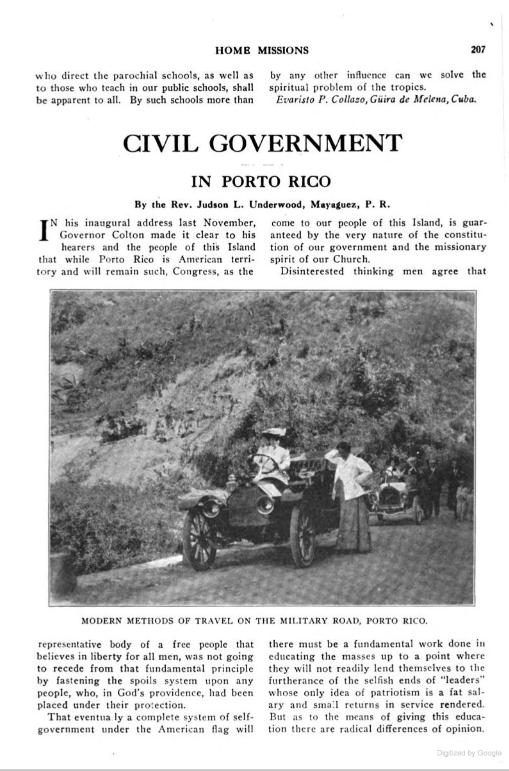
This excerpt from “Civil Government in Porto Rico” was published in The Assembly Herald, a Presbyterian newspaper in May of 1910. The purpose of this newspaper is to update and inform all readers about the activities and news of various church committees and boards. “Civil Government in Porto Rico” was written by Reverand Judson Underwood and was published under the “Home Missions Board” section. In this article, Underwood expresses a number of thoughts and concerns that align with other American missionary writers about Puerto Rico. In the piece, he laments the “ignorance” and “lack of moral sense” of Puerto Ricans that only a religious education can correct (Underwood, 208). Although he is critical of “secular” education implemented by the government, he is supportive of the imperial expansion of the United States to include Puerto Rico. All of this shows that Underwood sees Puerto Rico as a sort of “fixer-upper” that the United States and its dominant religion (Protestantism) must correct the Puerto Rican people so that the island may one day govern itself under the umbrella of the United States.
This piece illustrates how missionaries and the United States government were preaching the same ideology of Americanization that eventually results in self-government, even if their reasoning for helping in this campaign was different. Furthermore, it illuminates the relationship between missionary work and the United States government. Even though this source seems to disagree with the government’s wish for “purely secular education,” their ultimate goals of Americanization and imperial incorporation remain the same (Underwood, 208).
“That eventually a complete system of self-government under the American flag will come to our people of this Island, is guaranteed by the very nature of the constitution of our government and the missionary spirit of our Church.
Disinterested thinking men agree that there must be a fundamental work done in educating the masses up to a point where they will not readily lend themselves to the furtherance of the selfish ends of ‘leaders’ whose only idea of patriotism is a fat salary and small returns in service rendered. But as to the means of giving this education there are radical differences of opinion. […]
One of the chief obstacles to advance in the civil government in any Latin American country, as at home, is the Beast of Bossism. Here the boss is called ‘jefe,’ and he thrives principally on the ignorance and credulity and lack of moral sense of the masses. Both the more intelligent and the more ignorant classes under such conditions are unreliable as material on which to construct liberal government because of their lack of moral stamina. The ‘jefe’ stands opposed to education qualification for suffrage because his constituency is thereby diminished; and naturally the ignorant man does not want to be left in the background, but in turn loves to wield an influence over his faithful few.
Purely secular education will never be able to cope with these insidious conditions. Schools alone can never make men love the truth and hate a lie, love righteousness and hate iniquity. It therefore remains the work of the Church to contribute the moral element which alone can prepare the way for larger liberties.” (Pages 207-209)
Sources
Underwood, Judson. “Civil Government in Porto Rico,” in The Assembly Herald, Google Books. May, 1910. https://www.google.com/books/edition/_/GQkXAAAAYAAJ?hl=en&gbpv=1